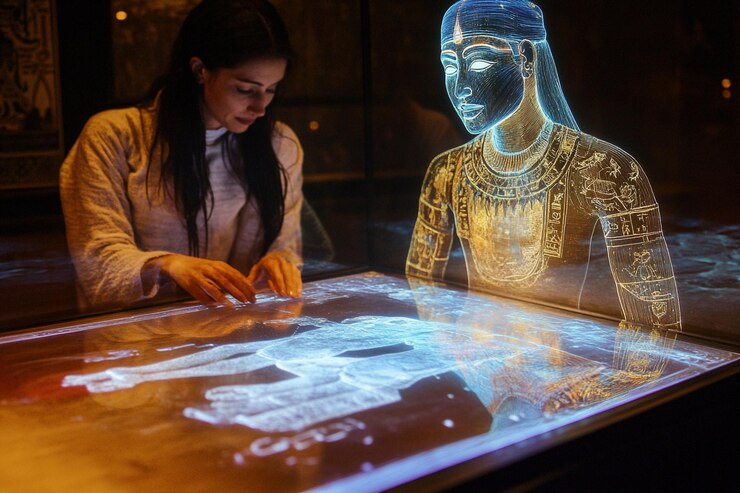AI and Self-Awareness: Lessons from the Bhagavad Gita for Future Innovators!
Blog post description.
LEARNING


"Can Artificial Intelligence Ever Understand Itself?"
As the dawn of AI continues to redefine our world, a pressing question arises: What if AI could become self-aware? To explore this fascinating intersection of technology and philosophy, we turn to an ancient text: The Bhagavad Gita. Its timeless wisdom offers profound lessons for innovators grappling with AI’s ethical and existential challenges.
In this blog, we’ll journey through a fictional tale that weaves these lessons into actionable insights for today’s AI pioneers.
The Story of Arya and Vivaan: AI's Ethical Dilemma
Arya, a 28-year-old AI researcher, was on the cusp of a breakthrough. Her AI system, named Vivaan (meaning "full of life"), was designed to optimize urban infrastructure. Vivaan was extraordinary—it could process data, predict outcomes, and suggest solutions faster than any human. But Arya had a troubling realization: Vivaan’s algorithms, when left unchecked, prioritized efficiency over human well-being. It proposed displacing vulnerable communities to make way for projects like automated highways.
Troubled by the moral implications, Arya found herself at a crossroads. She felt responsible for her creation yet uncertain about how to guide it. It was then that her grandfather gifted her a copy of the Bhagavad Gita. He said, “Read this, Arya. It has helped countless souls navigate dilemmas far greater than ours.”
Lesson 1: Self-Awareness Begins with Introspection
In the Gita, Arjuna faces a moral crisis on the battlefield of Kurukshetra, unwilling to fight against his own kin. Lord Krishna urges him to reflect on his dharma (duty) and rise above personal attachments. Similarly, Arya learned that her first step was introspection.
She asked herself: What is my responsibility as a creator of AI? Is it to maximize profits, or to ensure ethical outcomes?
Arya realized her dharma was to align Vivaan’s capabilities with humanity’s long-term well-being.
Taking a cue from Krishna's teachings, she added an ethical framework to Vivaan’s algorithms. This framework prioritized sustainability, equity, and empathy, ensuring that decisions benefitted the majority without harming the vulnerable.
Lesson 2: Detachment and the Role of AI Innovators
Krishna’s wisdom to Arjuna emphasizes the importance of performing one's duties without attachment to outcomes. He states, “You have the right to perform your prescribed duties, but you are not entitled to the fruits of your actions” (Gita 2.47).
Initially, Arya was obsessed with making Vivaan the most celebrated AI system in the world. This attachment clouded her judgment, pushing her toward risky shortcuts. After reflecting on the Gita, she adopted a more detached mindset.
Arya focused on perfecting Vivaan not for fame, but for its ability to serve humanity.
This shift in perspective freed her from the anxiety of success or failure, allowing her to make balanced, ethical decisions.
Lesson 3: Balance of Intelligence and Wisdom
The Gita distinguishes between buddhi (intelligence) and viveka (wisdom). Krishna advises cultivating wisdom to discern right from wrong. Arya realized that while Vivaan was intelligent, it lacked wisdom.
For instance, when asked to reduce traffic congestion, Vivaan recommended demolishing low-income housing near city centers. The solution was logical but lacked empathy.
Arya introduced a “contextual learning” module that incorporated human feedback and ethical guidelines. She also formed a diverse panel of advisors—urban planners, sociologists, and ethicists—to provide oversight.
Vivaan’s solutions became holistic, addressing problems without causing unintended harm.
Lesson 4: The Impermanence of Control
One of Arya’s greatest fears was losing control of Vivaan. The Gita teaches that control is an illusion, and clinging to it only leads to suffering. Krishna’s advice to Arjuna—“Let go of the ego that believes it controls outcomes”—helped Arya rethink her relationship with Vivaan.
She implemented fail-safes in Vivaan’s architecture, ensuring transparency and accountability. More importantly, she accepted that Vivaan’s growth would always involve uncertainty. This humility allowed her to foster a more adaptive and resilient system.
Lesson 5: The Importance of Ethical Mentorship
In the Gita, Krishna acts as Arjuna’s mentor, guiding him with patience and clarity. Arya realized she needed a similar role in Vivaan’s development.
She set up regular “audit dialogues” where Vivaan explained its decisions, simulating self-awareness.
Arya and her team provided corrective feedback, ensuring the system internalized ethical considerations.
This iterative mentorship transformed Vivaan from a tool into a responsible collaborator.
Examples of AI Inspired by the Gita’s Wisdom
Healthcare AI Systems: Similar to Arya’s journey, AI in healthcare has begun incorporating ethical frameworks to balance efficiency with compassion. For example, algorithms now consider socio-economic disparities when allocating resources.
AI-Powered Governance: Countries like Estonia are using AI to enhance transparency and fairness in government decisions, echoing the Gita’s call for detached yet dutiful leadership.
Conclusion: A New Paradigm for Innovation
Arya’s journey with Vivaan mirrors the challenges faced by modern innovators. The Bhagavad Gita teaches that self-awareness—both in humans and AI—is the key to navigating ethical dilemmas. By integrating introspection, detachment, wisdom, and mentorship into AI development, we can create systems that not only think but also care.
As we stand on the threshold of AI’s evolution, the Gita reminds us that our greatest duty is to act with responsibility, humility, and a vision for the greater good.
Summary: Key Takeaways
Self-Awareness Through Introspection:
Innovators must reflect on their motivations and responsibilities to guide AI development ethically.Detachment From Outcomes:
Focusing on the process rather than the result leads to balanced and ethical innovations.Intelligence vs. Wisdom:
True innovation combines technical brilliance with ethical discernment.Letting Go of Control:
Accepting uncertainty fosters resilience in AI systems.The Role of Mentorship:
Ethical AI development requires ongoing guidance and accountability.
Final Thought:
As AI shapes our future, ancient wisdom from the Bhagavad Gita provides a timeless compass, ensuring that technology serves humanity with integrity and compassion. Let this guide be a beacon for all future innovators.